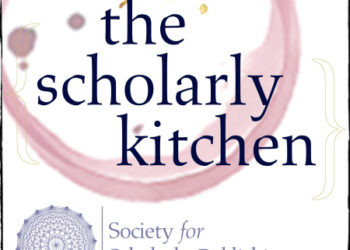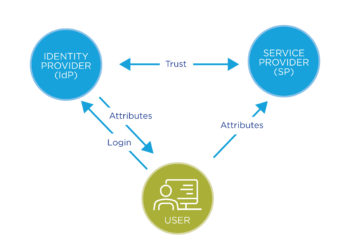Editor’s Note: You may not have noticed, but we’ve recently added some behind-the-scenes improvements at The Scholarly Kitchen. First and foremost, we’ve improved the site in terms of accessibility — all low-contrast text has been replaced by higher contrast text to improve readability, and we’ve added screen-reader attributes to “presentational” links. We’ve improved our author attribution tools as well — multi-author posts (here’s an example) now include information on all authors rather than just the lead author. And for guest authors, we’ve now added an individual byline, so the guest author’s name shows as the author of the post (and a bio is shown at the end of the post), rather than lumping all under the Scholarly Kitchen generic account. You can now see a list of guest authors and get quick access to all of their posts on our Guest Author page.
With these improvements in place, we thought it was a good time to remind our readers of our open invitation to guest authors. We’ve steadily increased the number of voices being heard in the Kitchen each year, and we want to hear from you. Lisa Hinchliffe’s post from 2018 which outlines how the process works can be found below.
One of my favorite scenes in Disney’s Beauty and the Beast is “Be Our Guest” for its delightful animation and lyrics. I’ll admit to not even minding when the lyrics get stuck in my head whenever I’m preparing to host a gathering in my home. “Be our guest; Be our guest; Put our service to the test; Tie your napkin ’round your neck, cherie; And we provide the rest…” Such fun!
Now, I can’t promise you that writing for the Scholarly Kitchen is quite as charming as a Disney film (though, maybe!) and the metaphors are going to get a bit tricky if I continue on with them much further; however, the question that I have been asked most often since becoming a Chef in the Scholarly Kitchen is a version of “how do guest posts work?”

David Crotty, Editor-in-Chief , regularly tweets, comments, etc. that the Scholarly Kitchen seeks guest posts and there is a general invite to get in touch with any Chef if you have an idea. This is good. We want to signal the overall openness to ideas and not put barriers in place.
But, I have wondered if everyone “hears” that open invitation in the same way? We know from research in other areas that being “open” isn’t always the same as being “inclusive” and that outreach and engagement are critical to bringing in diverse voices and perspectives. Cold-calling the Editor-in-Chief may seem daunting and perhaps one doesn’t have a connection yet to one of the other Chefs?
As I reflected upon this, I asked David if I could write about my experience as both a guest author and also as host to other guest authors with the goals of pulling back the curtain on the process and providing a bit of additional guidance. This isn’t a set of rules or a checklist of requirements but this is, in writing, the responses I’ve been giving when people ask me questions about guest authoring.
Who is Eligible to Be a Guest Author?
The Scholarly Kitchen is the blog of the Society for Scholarly Publishing (SSP), which has as its mission “to promote and advance communication among all sectors of the scholarly publication community through networking, information dissemination, and facilitation of new developments in the field.”
The Scholarly Kitchen’s purpose is to support this mission “by bringing together differing opinions, commentary, and ideas, and presenting them openly.” It’s scope is thus quite broad, including current awareness of developments in publishing including research reports and projects; interpretation of the significance of relevant research; identifying gaps; and translating findings from allied fields. If you are interested in authoring a guest post and have a topic that is in scope, you are eligible.
There are no requirements for educational background, employment status, or SSP membership status. What is off-limits, of course, is for an author to promote directly their own commercial interests though a post.
Will Someone Mentor Me?
The Scholarly Kitchen does not have a formal mentorship program at this time, though it is under consideration for development. Until that time, more informal mechanisms are available.
First, it is useful to know that David Crotty, as Editor-in-Chief, provides feedback and editing on all guest posts (as well as on the posts written by the Chefs). I have found his feedback fair and very useful in clarifying and strengthening my writing. For those of you familiar with the peer review process and how it can at times seem that peer reviewers are taking an adversarial, dismissive, or nit-picking stance, that has not been my experience with the Scholarly Kitchen. Instead, there is a sense of working together to publish the best possible piece. I have found this a remarkably positive experience. There is no single editorial viewpoint for the Scholarly Kitchen; the priority is a diversity of viewpoints presented in a coherent and well-supported manner.
In addition, for assistance in developing your initial idea or draft, I think approaching a Chef who you know or who is writing on similar topics may be useful as well. This was my approach as a guest author. If you don’t know someone yourself and sending that out-of-the-blue email is daunting, ask around in your network and see if anyone else knows one of us and could do an email of introduction. You can also ask David or Angela Cochran (Associate Editor) if they have any recommendations. As a Chef, I’ve been approached by people I know, people I don’t know, and via someone who knows the author and me. Finally, by writing this very post, I’m putting out there that anyone can contact me.
Okay, How Does it Really Work?
I’d suggest thinking about the process of being a guest author as having four parts – proposal, writing/editing, day-of-posting, and follow-up.
Proposal – An inquiry about being a guest author kicks off the guest authoring process. I recommend that your “ask” include a general statement of the topic you would like to write about, your proposed timeline (including if you are hoping to publish on a particular day to coincide with some other event), and the current status of your piece, which can be anything from a half-formed thought to already written draft. You should also demonstrate that you are familiar with the Scholarly Kitchen.
I’ve really appreciated how John Creswell, a well-known author of mixed methods research guides, provides templates for writing abstracts, proposals, etc. The result is a little bit clunky as a text but once you have the pieces you can revise as needed. So, in that spirit, here’s a fill-in-the-blank template for proposing a piece:
Dear ______,
I’m writing to inquire about publishing a guest post on the Scholarly Kitchen. My post would focus on ______ and <describe/ask about/analyze/ponder/posit> ______. I believe this post would interest SK readers because ____. Related SK posts include ______.
My post is currently at the <idea/outline/draft> stage and I would <appreciate feedback on my idea/comment on my outline/review of my draft>. I would hope to see the piece published by ______.
Thank you for considering this email. I look forward to hearing from you.
Best,
<your name>
<your contact information>
Writing/Editing – Scholarly Kitchen guest authors are advised to aim for about 1500 words; however, this is a very flexible guideline as it is widely understood that length needs to be calibrated to the breadth and depth of the topic being addressed. I find that most of my own essays are around 1800-2000 words. More than 2000 words would likely be a signal to reflect if the topic is scoped tightly enough for a blog post and/or if it could be separated into multiple topics.
A few other style tips: The style and tone of writing is closest to that of a trade publication or newspaper editorial page. Clarity rather than formality is the priority. Writing in the first person is acceptable and preferable to convoluted passive phrasing. “Citations” in Scholarly Kitchen posts are typically via linking rather than footnotes/bibliographic references.
Each Chef likely approaches working with a guest author in a slightly different way so let me share my approach as an example. I ask that a guest author send me their draft in either Word or Google Doc so that I can use track changes and comments to provide feedback. In addition, I will usually write a summary paragraph or two highlighting strengths, possible improvements — particularly related to reaching all of the audiences of SK (e.g., publishers, librarians, scholars, etc.), and questions I have.
After receiving a revised text, I then share it with David, including a transmittal cover note about the piece and my work with the author, and soliciting his review. At this point, the document should include a title, the text, and a suggestion for a one-sentence pull quote or summary that can be used in e-mail and on social media to promote the post. David typically provides a narrative summary response, which the author then has a chance to consider, as well as edits. When the author finalizes their text, David will load the text into WordPress. The author may suggest an image to accompany their text or David will select one.
The author is also asked to provide a short biography statement and to sign a Guest Contributor Agreement, which authorizes publication of the work in the Scholarly Kitchen while the author retains all rights including copyright and authorship.
The timeline from proposal to posting varies. It could be as short as one week though two or three is more typical. However, longer timeframes are also quite feasible. If you need to incorporate review by your employer into this process, that is not a problem though the timeline will likely need to be extended to incorporate this review.
Day-of-Posting – The Scholarly Kitchen publishes five days/week, Monday-Friday. Posts are published at 5:30 AM Eastern Time (U.S.). Notification of posting is sent to approximately 7,700 subscribers by e-mail. These notifications are staggered and so will be sent over the course of a few hours but all before noon Eastern Time. Posts are also promoted on social media. The readership is primarily in the U.S. and Europe and increasing accesses to a post trends with the start of the workday across the U.S.
My advice to guest authors is to make a note to read their own post on the site when it is published. First, it is a moment to celebrate and be proud of your contribution to field! Second, it reminds you what you wrote, particularly if it has been some time since you finalized the piece and its publication. This is particularly important if you receive comments as the reader only has access to what you wrote — not all of the things you thought about as you were writing. I know this is sometimes a challenge for me when I am writing on a topic about which I have published multiple things — it is easy to forget what you said where!
In addition, throughout the day, monitor the post for any comments. Comments on Scholarly Kitchen are moderated. It is the author’s decision about whether to engage with the comments but in general I have found them very beneficial. I have come to see comments as the kind of dialogue we might wish to have after giving a conference presentation. There is the opportunity to hear the perspectives of others, clarify any misunderstandings, and participate in a conversation with others who also care about the topic. This insight was inspired by my fellow chef Roger Schonfeld’s suggestion that one respond to comments as one would to questions or comments at a conference.
Readership and engagement on a post typically continues for a day or two after the initial posting. When you first respond to any comments, make sure you sign up for alerts for future comments, as this will let you know when one is added to your post.
Follow-Up – One benefit of publishing in the Scholarly Kitchen is that it is a platform with immense reach in scholarly publishing. I have found that readership of my posts on TSK will immediately outpace that of essays I post on my personal blog. We try to follow up with a message to each guest author letting them know their readership statistics; however, if at any point statistics are useful to you, e.g., for inclusion in an annual performance report (or even if you’re just curious), these can be provided.
Finally, because I have faith that your first guest author experience will be a positive experience, take time to consider when you might write another post!
I hope this piece has been helpful in revealing how the guest authoring process works. Guest posts add vibrancy and variety to the Scholarly Kitchen. Be Our Guest!
Discussion
1 Thought on "Revisiting Our Open Invitation to Guest Authors"
I definitely keep flirting with the idea of writing something for SK as I rather enjoy reading it. But I find myself sometimes stuck thinking through an idea, writing it, and wondering if it is useful/relevant and should I complete it. For a few other sites I’ve written pieces for, one thing I know that helps is providing prompts, recommendations for approaching topics anew, or just some clearer idea on what hasn’t been done yet or could be done in a different way. Don’t get me wrong, I do read regularly and can search the site but it’s never quite clear how much rehashing or how much new ground SK is looking for (at least from my experience).
Lance



